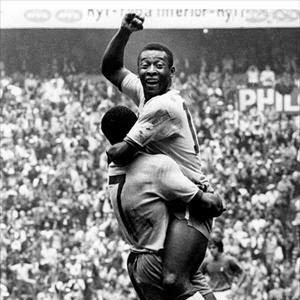Footie World Cup : The History of FIFA
 |
| Even I know who Pele is. |
But I have no idea about the history, or why my buddies were so passionate about this world cup.
First, a primer. FIFA (Fédération Internationale de Football Association) is a non governmental orgnaization, but governed by Swiss Law. (Those Swiss are pretty easy going I think so it would be pretty chill) It was started in 1904 because the increase in international matches led to many in Europe wanting an overall governing body. It was formed in Paris and France, Belgium, Denmark, Netherlands, Spain, Sweden and Switzerland all signed up. Germany soon joined after. This is interesting to me, as this time period everyone in Europe is sort of getting along, but very tentatively. England, after not wanting to join in at first, decided to join in a year later.
A great surprise to me, FIFA and the International Olympic Committee were in a pissing match with each other right from the start. Each wanted complete control over rights to stage football world championships. It took until 1920 for the two groups to agree and FIFA could even discuss having a world cup. The reason why FIFA wanted it so bad was, as FIFA governor Henri Delaunay stated:
"International [soccer] can no longer be held within the confines of the Olympics and many countries where professionalism is now recognized and organized cannot any longer be represented there by their best players."The IOC finally relented and in 1928, planning began for the first World Cup in 1930. Uruguay was granted the first Cup as it knew how to sweeten the pot: it offered to pay for the other countries travel and hotel expenses, and they would build a band new stadium. To their delight, Uruguay also won the first world cup. Two more would be held until World War Two started and wrecked all the good times.
 |
| And the traditions of guys with great hair begins. |
The World Cup started back up again in 1950 and is now held every four years, just like the Olympics. And just like the Olympics, politics and egos often got in the way.
1966: England and West Germany were fighting it out in London. England won their first and only World Cup with a 4-2 after extra time. The controversy was that the third goal by the English hit the underside of the cross bar, bounced down on the line and was cleared. They officials deemed it good. much to many people's bitterness as they thought it broke the rule that it should go over the line, in their mind. People still whinge about it today.
1973: The Soviet Union versus Chile was a political and sad nightmare. The two countries were vying for a spot for the play offs. They were supposed to play in November Santiago in their stadium, where two months before the new dictator of Chile Augusto Pinochet had executed people. the Soviets asked for a different venue, and when no one would agree to a move, they refused to take to the field, and were disqualified. The Chileans did show up to play. This shows to me that that team had some serious moral and ethical soccer balls and we should really hear more about this.
 |
| Prisoners at the stadium two months before the match: yeah, no. |
"Football is much more than just a game. Its universal appeal means it has a unique power and reach which must be managed carefully. We believe that we have a duty to society that goes beyond football: to improve the lives of young people and their surrounding communities, to reduce the negative impact of our activities and to make the most we can of the positives."
 |
| Sport versus social needs: so not everyone's a fan in Brazil? |
More on Football:
The politics of the sport and FIFA are discussed well at Soccer Politics
Check out more history at Sportsnet's great primer on the history of FIFA.
Here's a great list of every world cup winner at the football bible site.
No comments:
Post a Comment